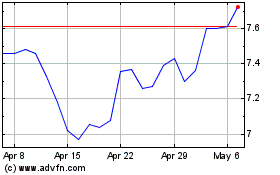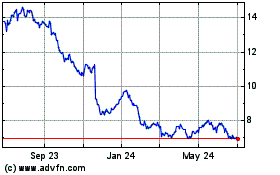Bayer's Roundup Faces New Setback in France -- WSJ
January 16 2019 - 3:02AM
Dow Jones News
By Ruth Bender
This article is being republished as part of our daily
reproduction of WSJ.com articles that also appeared in the U.S.
print edition of The Wall Street Journal (January 16, 2019).
BERLIN -- Bayer AG's fight to prove its recently-acquired
weedkillers are safe faced a setback in Europe Tuesday as a French
court revoked approval for one of its glyphosate-based products
because it might cause cancer.
The ruling effectively bans Bayer from selling the weedkiller in
France. While the product is a small seller there, the court action
could also give ammunition to plaintiffs who are suing the
chemicals and pharmaceuticals company in the U.S. over Roundup and
Ranger Pro weedkillers, which it inherited as part of its $63
billion takeover of Monsanto Co. last year.
Bayer is facing some 9,300 lawsuits alleging Roundup products
gave the plaintiffs cancer. Bayer is appealing a first verdict in a
California state court that awarded $78.5 million in damages to a
school groundskeeper with non-Hodgkin lymphoma, arguing that
numerous scientific studies and regulatory authorities have
maintained that glyphosate was safe to use.
The administrative court in Lyon, France, said Tuesday that
despite the European Union's approval of the active ingredient
glyphosate, scientific studies and animal testing showed Bayer's
Roundup Pro 360 weedkiller was potentially carcinogenic to humans
and was likely to be harmful to human reproduction and aquatic
organisms. It said the ban was effective immediately.
"The decision itself isn't precedential but it could certainly
be influential," said Elizabeth Burch, a professor specializing in
mass torts cases at the University of Georgia.
Corinne Lepage, the lawyer representing the Committee for
Independent Research and Information on Genetic Engineering, which
brought the case to court in France, said the principle of the
decision could potentially put into question all glyphosate-based
products.
Bayer said it disagreed with the decision. "This product
formulation, like all crop protection products, has been subject to
a strict evaluation by the French authorities (ANSES), an
independent body and guarantor of the public health security,"
Bayer said in a statement. The company said it was considering its
legal options.
ANSES, France's agency for food and environmental regulation,
which authorized the marketing of the weedkiller in 2017, said it
would carefully review the court decision.
The impact on Bayer sales from the loss of the French market
would be minor, said Wimal Kapadia from Bernstein Research. "This
is one move by a municipality, but we will likely see others,
absent a change in sentiment," he said.
Glyphosate, invented by Monsanto Co. under the Roundup brand,
has been hotly debated since the World Health Organization's
International Agency for Research on Cancer in 2015 classified the
substance as potentially causing cancer in humans.
The debate has been particularly divisive in the European Union,
whose member states granted glyphosate a new five-year license in
2017. The decision was reached after a surprise last-minute nod
from Germany that raised eyebrows among neighbors.
The episode resurfaced on Tuesday, after a report commissioned
by center-left members of the European parliament said entire
sections of the glyphosate evaluation by Germany's Federal
Institute for Risk Assessment, or BfR, had been copied from
Monsanto's renewal application.
In the parliament members' report, a plagiarism researcher and a
biochemist who is a member of a group that seeks to ban glyphosate
allege that "the BfR's practice of copy-paste and plagiarism is at
odds with an independent, objective, and transparent assessment of
the risks, and that this practice influenced the authority's
conclusions on glyphosate's safety."
The German institute denied the allegations, arguing it had by
no means taken on conclusions from the applicant without verifying
them.
The European Parliament on Wednesday is expected to complete an
inquiry into how glyphosate was authorized on the European market
and issue recommendations calling for a ban on the use of
pesticides in public spaces, according to a draft of the text due
to be adopted.
Meanwhile, some European countries such as France and Germany
have moved to phase out glyphosate-based products in the coming
years.
--Valentina Pop and Donato Paolo Mancini contributed to this
article.
(END) Dow Jones Newswires
January 16, 2019 02:47 ET (07:47 GMT)
Copyright (c) 2019 Dow Jones & Company, Inc.
Bayer Aktiengesellschaft (PK) (USOTC:BAYRY)
Historical Stock Chart
From Mar 2024 to Apr 2024

Bayer Aktiengesellschaft (PK) (USOTC:BAYRY)
Historical Stock Chart
From Apr 2023 to Apr 2024
